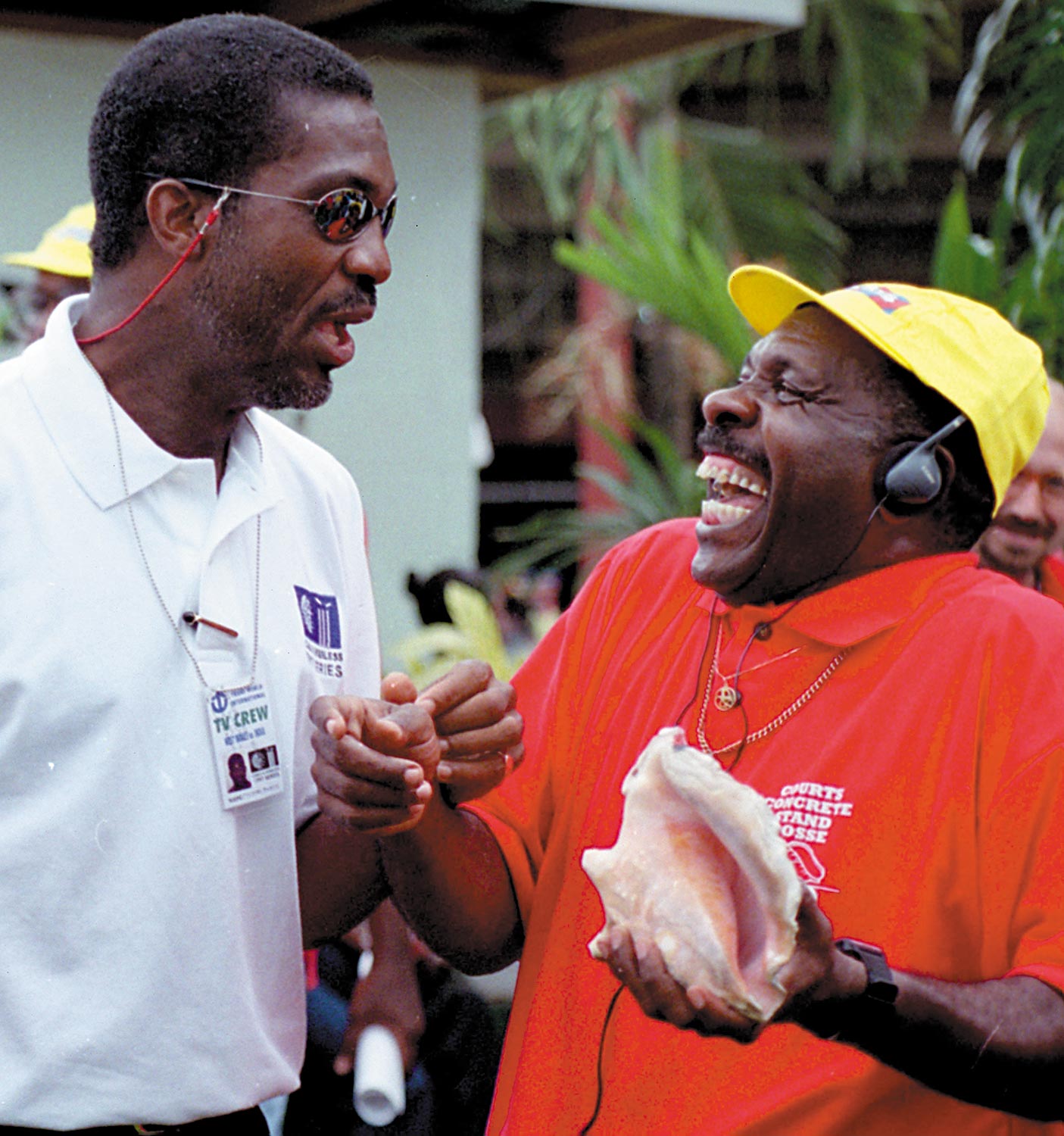Ah, the great figures of the Caribbean cricket field! Weekes, Worrell and Walcott. Sobers, Lloyd and Lara. Gravy and Chickie, Mayfield and Gearbox, Blue Food, Flagman, Britannia Bill and King Dyal . . .
One of the most famous characters ever to grace the now retired Antigua Recreation Ground (the Sir Vivian Richards Cricket Stadium will be taking over for the ICC Cricket World Cup) was Labon Kenneth Blackburn Leeweltine Buckonon Benjamin, better known as Gravy. Some say he was famous as Richards and Ambrose themselves.
Between 1988 and 2000, cricket in Antigua just wasn’t cricket without him. Cross-dressed in his tutu, colourful shawls and platform boots, climbing along the beams or rafters, he danced and wined as if it was Carnival Monday. During the 1990 England vs. West Indies series, televised around the world by Sky, Gravy’s gymnastics, his head spins and gyrating talent, gained a global audience.
He claimed he even affected the opposing players. “When the water cart is on the ground it allows me a chance to make the opposition not to be a part of the water cart. They forget to drink the water because they’ve never seen anything like me. They’re thirsty and they’re back in play. They’re listening to me, watching me. By that time, Ambrose and Walsh have taken their wickets.”
For his retirement party during the 2000 England tour of the West Indies, Gravy donned a white wedding gown, complete with accessories, remarking that he planned to “make the occasion one to remember.” Both players and fans loved his style and the Caribbean fun he brought to the stands. Viv Richards himself once said: “Gravy, what you’re doing, keep on doing it, cause the world is happy when you do it.”
DJ Chickie, the pioneer of music-in-between-overs, always provided a soundtrack to accompany Gravy’s dancing. Chickie’s Disco, as it came to be known, is another classic example of what watching cricket in the Caribbean is all about. Today, music and cricket go together like bat and pad. But it was Chickie who first gave supporters music before play, music when a wicket fell, music when a boundary was scored, music during the drinks break, and music late into the evening.
Cricketing DJs now dominate every stadium in the Caribbean. They are performers in their own right, effortlessly mixing excitement and irony. When Viv Richards hit his record 56-ball hundred, Chickie (Viv’s old schoolmate) taunted David Gower, the England captain, by spinning the Gypsy track “Captain, the Ship is Sinking”. Everyone at the ground, including the England fans and journalists, cheered and smiled.
Colin Cumberbatch once explained Chickie’s soundscape. “He knows his cricket. He always makes sure that the speakers are at an elevation, so that the breeze, that usually blows from only one side, takes the music away from the field of play. Because of this, the players don’t get annoyed by the music. When an over is about to start, Chickie knows how to fade the music down. He will do it without affecting the listener, and without affecting the players.”
Gravy and Chickie weren’t the only cricketing sideshows in Antigua. Ruperth “Pappie” Mussington was a legendary blower of bugle and conch; Ms Red Stripe was a provocative cross-dresser; and of course there was Gravy’s great rival, Mayfield.
Camped at the opposite end of the ground, Mayfield may not have possessed Gravy’s dress sense, but he certainly had his moments, and loved outrageous props. In 1994, as Brian Lara broke Garry Sobers’s long-standing Test batting record, Mayfield famously ran onto the field with a bunch of LPs and amid the melee proceeded to break vinyl and toss it in the air in honour of the “record-breaker”. The rivalry between Gravy and Mayfield was so intense that they were even supposed to have a boxing match one Friday evening in St John’s. Both declared that the other never turned up.
At the Kensington Oval in Barbados, Dundonald Redvers Dyal, aka His Majesty King Dyal, continued a tradition of vocal crowd commentary dating back to the late nineteenth century and championed by historic characters like Britannia Bill and Fred Flannigan. Perversely, these supporters, being from Barbados (“Little England”), would always support England. Needless to say, this produced decades of heckling from local crowds, to which the King, wearing his crown and smoking his pipe, would always have an answer.
Dyal’s father was a master tailor, and the King considered himself the best-dressed man in Barbados, if not the world. He would often change his coloured suits at lunch and tea. They always had matching accessories, with appropriately coloured pipes and walking sticks. Locals called him an “old school colonial”. But despite his colonial allegiance, the King was a crowd favourite and one of Mike Holding’s favourite interview subjects.
Several other grounds in the Caribbean have their iconic supporters. One is Mac Fingall, who, if he wasn’t spraying magic voodoo dust on the field to jinx visiting teams, was passing out whistles, shells and hair curlers, and conducting the crowd into a musical frenzy. “Gearbox” kept fans amused with his imitations of a vehicle gearbox. Blue Food from Trinidad and Tobago was the hardest blower of a conch shell in the Caribbean. Handkerchief on head, he would whip up support in the stands, rally the fans and teach foreign supporters properly riotous Caribbean etiquette.
Anyone who has been to a 20/20 cricket match will know that much of this entertainment has travelled to countries far afield — the horns, the dancing, the music, the jokes. It has become part of our cricketing history. After a day in the stands at any of our grounds, one can only echo the famous remark of C.L.R. James: “What does he know of cricket who only cricket knows?”























